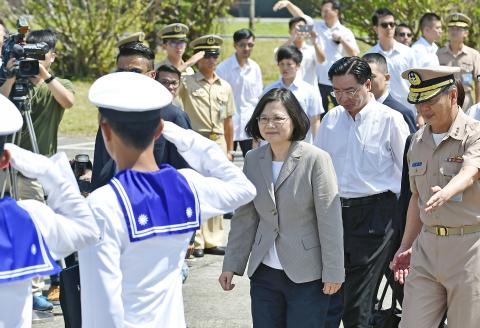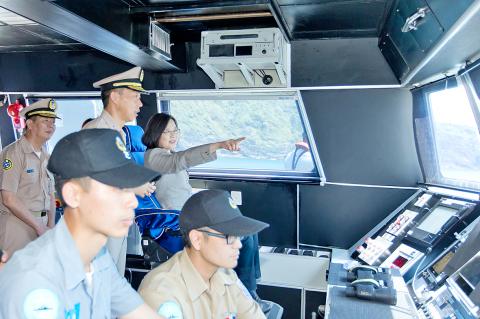President Tsai Ing-wen (蔡英文) yesterday reiterated her administration’s determination to push for a self-reliant national defense force as she spoke on board a domestically built warship off Yilan.
Following an inspection tour of air bases in Hualien on Sunday last week — the first time in her capacity as commander-in-chief of the nation’s armed forces — Tsai visited a naval base in Yilan County’s Suao Township (蘇澳) and boarded the Tuo Jiang, the nation’s first locally built stealth missile corvette that was commissioned in March last year.
She said that the nation would continue to promote a policy of building its own vessels.

Photo: SAM YEH, AFP
“In addition to enhancing naval combat capacity, it will also help the development of the shipbuilding and machinery sectors, as well as system integration,” Tsai said.
The government’s approach would be to make “demands for national defense the driving force of industrial upgrade and transformation,” Tsai said.
However, the government is bound to encounter numerous challenges in the pursuit of a self-reliant national defense force she said.

Photo courtesy of the Military News Agency
“The path is not an easy one, but there is no return,” she told officers and cadets aboard the Tuo Jiang.
She said the nation has used superior technology in the building of the Tuo Jiang and “more importantly, we have the determination to succeed.”
Tsai, accompanied by Minister of National Defense Feng Shih-kuan (馮世寬), Chief of General Staff Yen De-fa (嚴德發) and National Security Council Secretary-General Joseph Wu (吳釗燮), said it was her first time on board the Tuo Jiang, and when the vessel sailed out of Suao, she said she “was deeply touched” to see the powerful naval vessel and the beautiful Yilan coast.
Tsai said that hoisting the flag of the commander-in-chief on the ship was an honor and responsibility.
“I am privileged to be able to safeguard our homeland and marine lifeline with all of you in the navy,” she said.
Tsai also said the Tuo Jiang is a symbol of David fighting Goliath.
On Sept. 2, 1958, in one of the major sea battles in the Taiwan Strait, a naval vessel named the Tuo Jiang was shelled by Chinese ships and 11 of its 81 crew were killed, including medical officer Chen Ke-jung (陳科榮), who continued to tend to the wounded, despite his injuries, and later died of blood loss.
Tsai also said that Taiwan is surrounded by the sea, which she described as the nation’s gateway to the world, and she encouraged everyone to learn how to protect the nation’s sea lanes.
The Tuo Jiang, with Tsai and her entourage on board, made a short cruise that lasted 25 minutes.
Tsai later inspected an army base and dined with the personnel of an infantry brigade.
She said that while the base had been freshly painted, what is more important is whether the quality of equipment is good enough.
“Just painting and mowing the lawn [in anticipation of an inspection] will not make the military better,” she said, adding that the government would continue to push for national defense reforms.
A good combat force needs a good system, high efficiency and good morale, she said.
Tsai has inspected the air force, army and navy since taking office on May 20 in a show of balanced attention to the three forces.

Tropical Storm Gaemi strengthened into a typhoon at 2pm yesterday, and could make landfall in Yilan County tomorrow, the Central Weather Administration (CWA) said yesterday. The agency was scheduled to issue a sea warning at 11:30pm yesterday, and could issue a land warning later today. Gaemi was moving north-northwest at 4kph, carrying maximum sustained winds near its center of up to 118.8kph and gusts of 154.8kph. The circumference is forecast to reach eastern Taiwan tomorrow morning, with the center making landfall in Yilan County later that night before departing from the north coast, CWA weather forecaster Kuan Shin-ping (官欣平) said yesterday. Uncertainty remains and

SEA WARNING LIKELY: The storm, named Gaemi, could become a moderate typhoon on Wednesday or Thursday, with the Taipei City Government preparing for flooding A tropical depression east of the Philippines developed into a tropical storm named Gaemi at 2pm yesterday, and was moving toward eastern Taiwan, the Central Weather Administration (CWA) said. Gaemi could begin to affect Taiwan proper on Tuesday, lasting until Friday, and could develop into a moderate typhoon on Wednesday or Thursday, it said. A sea warning for Gaemi could be issued as early as Tuesday morning, it added. Gaemi, the third tropical storm in the Pacific Ocean this typhoon season, is projected to begin moving northwest today, and be closest to Taiwan on Wednesday or Thursday, the agency said. Today, there would likely

DISRUPTIONS: The high-speed rail is to operate as normal, while several airlines either canceled flights or announced early departures or late arrivals Schools and offices in 15 cities and counties are to be closed today due to Typhoon Gaemi, local governments announced last night. The 15 are: Taipei, New Taipei City, Taoyuan, Tainan, Keelung, Hsinchu and Kaohsiung, as well as Yilan, Hualien, Hsinchu, Miaoli, Chiayi, Pingtung, Penghu and Lienchiang counties. People should brace for torrential rainfall brought by the storm, with its center forecast to make landfall on the east coast between tonight and tomorrow morning, the Central Weather Administration (CWA) said. The agency issued a sea warning for the typhoon at 11:30pm on Monday, followed by a land warning at 11:30am yesterday. As of

CASUALTY: A 70-year-old woman was killed by a falling tree in Kaohsiung as the premier warned all government agencies to remain on high alert for the next 24 hours Schools and offices nationwide are to be closed for a second day today as Typhoon Gaemi crosses over the nation, bringing torrential rain and whipping winds. Gaemi was forecast to make landfall late last night. From Tuesday night, its outer band brought substantial rainfall and strong winds to the nation. As of 6:15pm last night, the typhoon’s center was 20km southeast of Hualien County, Central Weather Administration (CWA) data showed. It was moving at 19kph and had a radius of 250km. As of 3pm yesterday, one woman had died, while 58 people were injured, the Central Emergency Operation Center said. The 70-year-old